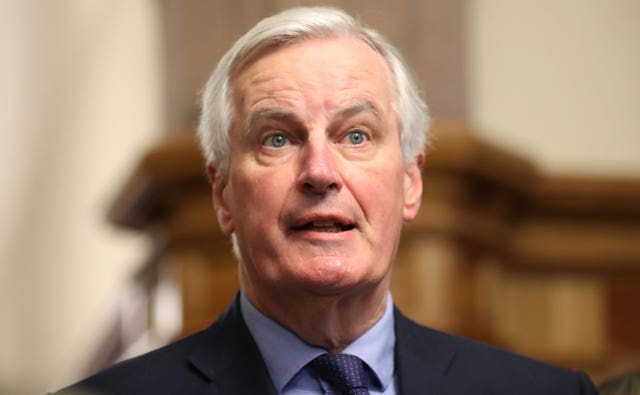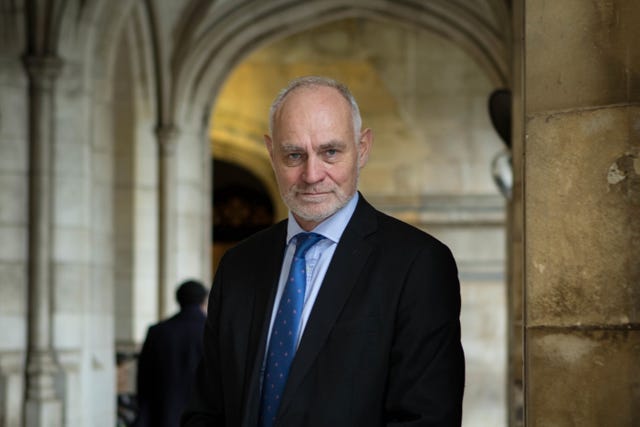
Downing Street should seek to “thrash out” its differences with its Brexit opponents rather than setting up a unit to “accuse and attack them”, Iain Duncan Smith has said.
The former Tory leader told Newsnight that a meeting with critics would carry the party with them, after a senior fellow Brexiteer warned that Theresa May’s Chequers deal could split the party.
Former Brexit minister Steve Baker said he was “gravely concerned” about a potential schism in Tory ranks if the Prime Minister did not change direction.
It came as the EU’s chief Brexit negotiator Michel Barnier suggested it was “realistic” to believe a Brexit deal could be agreed between the UK and EU in the next six to eight weeks.
 Steve Baker warned of a split in Tory ranks (Chris McAndrew/UK Parliament/PA)
Steve Baker warned of a split in Tory ranks (Chris McAndrew/UK Parliament/PA)
His intervention moved the currency markets but opinion was divided on whether this meant he thought that the Chequers plan might succeed in some form.
Mr Duncan Smith spoke to Newsnight on Monday after a group of Tory MPs who oppose the Chequers plan were invited to a meeting at Downing Street.
He told the programme: “I always think that rather than allowing a unit in Downing Street to take on its own colleagues and backbenchers, and accuse and attack them, I think the best thing is always for them to say, ‘I tell you what, let’s get together and thrash this out and see what we can come up with’.
“That’s a far better approach because it carries the party with you.”
 Michel Barnier said a deal in November is possible (Niall Carson/PA)
Michel Barnier said a deal in November is possible (Niall Carson/PA)
Mr Barnier had sparked excitement earlier in the day while speaking at the Bled Strategic Forum in Slovenia, saying: “If we are realistic, I want to reach an agreement on the first stage of the negotiation, which is the Brexit treaty, within six or eight weeks.
“The treaty is clear, we have two years to reach an agreement before they leave… in March 2019.
“That means that taking into account the time necessary for the ratification process in the House of Commons on one side, the European Parliament and the Council on the other side, we must reach an agreement before the beginning of November. I think it is possible.”
However, another Brexiteer, Crispin Blunt, played down the significance of the comments.
 Crispin Blunt played down Mr Barnier’s remarks (UK Parliament/PA)
Crispin Blunt played down Mr Barnier’s remarks (UK Parliament/PA)
He told Newsnight: “If you listen carefully to what Michel Barnier said there was no movement, there was an expression of confidence that we can get an agreement on the withdrawal agreement where we are going to give them £39 billion.
“Terrific. (It’s) Unsurprising that they are going to go for that agreement.
“He has been distinctly cool on Chequers. Simply saying it is the basis for discussion is hardly earth-shattering, and then you have had strong opposition to Chequers from people like the French Europe minister and others.”
Mr Baker, a leading figure in the pro-Brexit Tory European Research Group, said the party’s annual conference in Birmingham, starting on September 30, could prove a decisive moment as Mrs May is forced to acknowledge the scale of grassroots opposition to her proposals.
Number 10 said critics of the plan had yet to come forward with a credible alternative which would avoid the return of a hard border between Northern Ireland and the Republic.
But Mr Duncan Smith told Newsnight there were “plenty of solutions for that and those will be presented later on”.
He added: “The key point is the (European) Commission has to be prepared to come to that party and say, ‘yes, we are prepared to show some flexibility on this’, so that there can be a UK-wide free trade deal.
“If they do that I think you could make dramatic progress.”
Meanwhile, fellow former Conservative leader William Hague wrote in the Daily Telegraph that it would not be an exaggeration to say Britain could face “the most serious constitutional crisis in Britain for at least one century, possibly two” if a Chequers-based Brexit deal was blocked.
He said: “It is worth thinking about (the various scenarios) because everyone in Parliament who is enjoying making categoric statements about being against Chequers or against ‘no deal’ is now loading the revolver for a game of Russian roulette, with a lot more than Brexit at stake.”


Comments: Our rules
We want our comments to be a lively and valuable part of our community - a place where readers can debate and engage with the most important local issues. The ability to comment on our stories is a privilege, not a right, however, and that privilege may be withdrawn if it is abused or misused.
Please report any comments that break our rules.
Read the rules hereLast Updated:
Report this comment Cancel